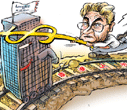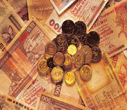Personal Finance
China's housing prices expect slight dip in Q4
(Xinhua)
Updated: 2009-11-17 11:19
Housing price rises in China are expected to slightly fall in the fourth quarter of this year as price hikes and reduced lending may curb property purchases, the nation's top think tank said in a report issued Monday.
Volume of property sales may decline in the fourth quarter, but investments in the real estate market will keep growing, the Chinese Academy of Social Sciences (CASS) said in the report.
The report did not distinguish between new home prices and second-hand house prices.
October saw property prices in 70 medium and large cities rise 3.9 percent from a year earlier and 0.7 percent from September, according to data from the National Bureau of Statistics last week.
New home prices climbed 0.9 percent in October from September, 0.1 percentage points higher than the growth rate in September. However, growth rate of second-hand house prices eased in October. Second home prices rose 0.4 percent month-on-month in October, but the growth rate was 0.1 percentage points down from that in September.
Prices of second-hand houses in some major cities started to fall. For instance, average price of second-hand houses stood at 11,920 yuan ($1,745.6) per sq m in October, down 1.65 percent from September, according to the municipal bureau of statistics.
Housing prices returned to growth on month-on-month basis in March on record lending and helped the government's favorable policies to stimulate property consumption, including tax breaks and interest rates cuts.
Chinese banks extended 8.92 trillion yuan of loans in the first 10 months, 5.26 trillion yuan more than the same period of last year, after the government scraped lending restrictions for banks last year to accelerate investment.
However, the record lending triggered concerns of assets bubbles and pushed up housing prices beyond the level of affordability for many.
Speculation was the main reason behind the current price hikes, said the report.
The real problem was that financial institutions did not strictly implement favorable policies, which spurred excessive demand and speculation, said Ni Pengfei, researcher with the Institute of Finance and Trade Economics of the CASS.
The government has not adopted forceful measures to curb speculation and may take further steps to spur housing consumption as the economic recovery was still largely dependent on property market, said the report.
Government data showed that the country's real estate sector accounted for more than 20 percent of urban fixed-asset investments, a key driver of China's economic recovery.
The report forecast that property prices would stabilize in the first quarter of 2010, rise on expectations of inflation in the second quarter, and stabilize or slightly dip in the third and fourth quarters.
The property market is not likely to see drastic increases in supply or promotions with discounts in the short term as property developers had sufficient funds at hand because of the loose monetary policy and earnings from sales this year, the report said.
The country's property developers reaped impressive sales revenue on rising prices. China Vanke Co, the country's largest property developer by market value, posted a 35.2 percent jump from a year ago in sales revenue to 52.69 billion yuan in the first 10 months.
China is also expected to face rising expectations of inflation in the first two months of 2010, which would further boost the property market, Ni Pengfei said.
| ||||
China's long-term urbanization trend has lay a solid foundation for the property market, while housing affordability remains a concern for many ordinary Chinese, said Ni Pengfei, a researcher at the CASS.
China should continue to carry on its stimulus policies in place, while fine-tuning its economic policies so that it can benefit the ordinary citizens who are trying to buy homes without speculative intents.
China has been increasing government-backed expenditure on fixed-asset investment to spur economic growth. But the investments from the private capital should be greatly increased in China while gradually declining the government-led investments, according to the report.
China economy should change the emphasis from expansion in terms of size in 2010 to structural adjustments while continuing to carry on the stimulus plan, said Pei Changhong, head of the Institute of Finance and Trade Economics, CASS.
The report suggested China continue to implement active fiscal policy, appropriately adjusting the patterns of budgetary expenditures and incomes.
China needs fine-tune moderately loose monetary policy based on the changing economic situations.
The report is first green book of its kind published in China. Green book is a type of report published by government sectors carrying suggestions waiting to be accepted by the government.













